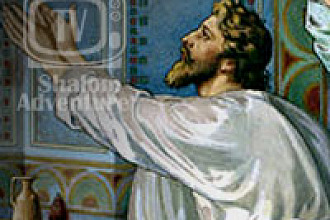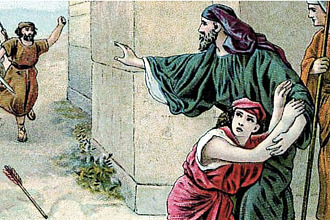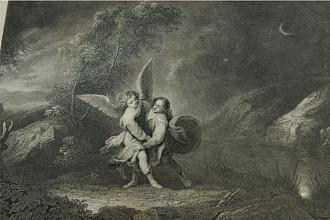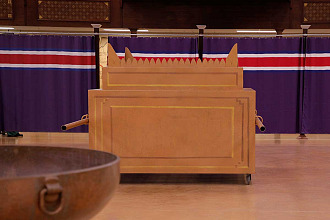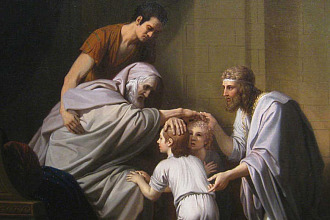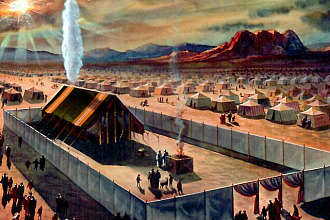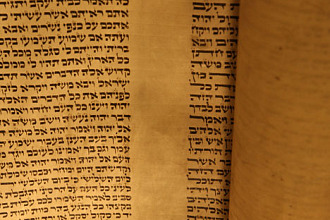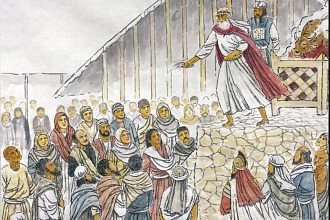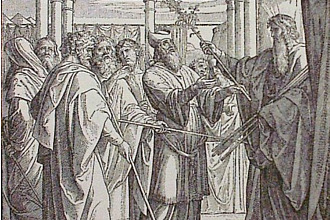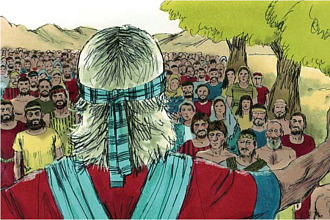Parasha for the Week: Tazriah-Metzora: Leviticus 12:1 - 14:33.
Haftarah for the Week: 2 Kings 4:42 – 5:19.
Apostolic Writings: Acts 15:19 – 21.
Tazriah
The Torah commands a woman to bring a korban after the birth of a child.
A son is to be circumcised on the eighth day of his life. The Torah introduces the phenomenon of tzara’at (often mistranslated as leprosy) — a miraculous disease that attacks people, clothing and buildings to awaken a person to spiritual failures.
A kohen must be consulted to determine whether a particular mark is tara’at or not.
The kohen isolates the sufferer for a week.
If the disease remains unchanged, confinement continues for a second week, after which the kohen decides the person’s status.
The Torah describes the different forms of tzara’at. One whose tzara’at is confirmed wears torn clothing, does not cut his hair, and must alert others that he is ritually impure. He may not have normal contact with people. The phenomenon of tzara’at on clothing is described in detail.
Metsorah
The Torah describes the procedure for a Metzora’ (a person afflicted with tzara’at) upon conclusion of his isolation.
This process extends for a week, and involves offerings and immersions in the mikveh. Then, a kohen must pronounce the Metzora’ pure. A Metzora’ of limited financial means may substitute lesser offerings for the more expensive animals.
Before a kohen diagnoses that a house has tzara’at, household possessions are removed to prevent them from also being declared ritually impure. The tzara’at is removed by smashing and rebuilding that section of the house; if it reappears, the entire building must be razed. The Torah details those bodily secretions that render a person spiritually impure, thereby preventing his contact with holy items, and how one regains a state of ritual purity.
“Elijah and Circumcision”
One of the mitzvot which Jews have kept throughout the generations and sometimes at great personal risk was the mitzvah of Brit-Milah (circumcision). Parashat Tazriah begins with the commandment that if a woman gives birth to a son then on the eighth day he shall be circumcised.
This mitzvah was already given in Genesis when G-d commanded Abraham to be circumcised and also to circumcise his son Yitschak at eight days.
The mitzvah of Brit-Milah serves as a covenant between G-d and the Jewish people. The Torah states, “And G-d said to Abraham, ‘As for you, you shall keep My covenant, you, and your children after you throughout the generations. This is My covenant which you shall keep, between Me and you and your children after you; every male among you shall be circumcised. . . My covenant shall be in your flesh for an everlasting covenant. ’” (Genesis 17:9).
Abraham was the first to perform this mitzvah at the age of ninety nine.
Yitzchak was the first to be circumcised on the eighth day.
From Yitzchak on his descendants were always careful to perform this mitzvah on the eighth day. If, for medical reasons, the Brit-Milah cannot be performed on the eighth day it is pushed off to when the child is healthy enough to go through this procedure.
We can also see the greatness of this mitzvah for the Jewish people by the fact that this mitzvah is performed even on Shabbat or Yom Kippur. However, this applies only when Shabbat or Yom Kippur is the actual eighth day, but a Brit cannot be performed on Shabbat or on Yom Kippur when it is performed after the eighth day.
At every Brit-Milah there is a special chair prepared which is called, Kisay shel Eliyahu Hanavi (The Chair of Elijah the Prophet). One of the important honors distributed at the Brit-Milah is to place the child on this special chair before the circumcision to be blessed by Elijah the Prophet. The reason of this tradition is found in the story of Elijah: Ach’av, King of Israel, under the influence of his wife Jezebel, broke the covenant with G-d and according to the Jewish tradition banned circumcision throughout the promise Land. The Prophet Elijah, saddened by this event, retired to a cave and complained to G-d that his people had deserted G-d’s covenant (1 Kings 19:10-14). Elijah heard the presence of God “When Elijah heard it, he wrapped his face in his mantle and went out and stood at the entrance of the cave” (1 Kings 19:13). Therefore and in honor to this event the Jewish tradition said that Elijah is present at every circumcision—It is not a matter of immortality of the soul here, because Elijah never died and went directly to heaven on a chariot of fire without dying—In Elijah’s honor The Jewish people provide a special chair for him at every Brit-Milah.
"Universal Priesthood"
The Torah states: “If a tzora’at affliction will be in a person…” (Leviticus 13:9). The business of living in this world is about being able to see through the physical to the spiritual.
In this week’s parasha, we learn of the spiritual afflictions of tzora’at and nega’. These appeared on the skin of a person. The sages of Israel teach that in Hebrew, the word “skin,” ohr, if written with an aleph instead of an ayin means “light.” These two words are pronounced almost identically. In other words, the “skin” of the world, the way the world looks like from the outside, is that it seems that though things run by themselves just as if there were no visible Hand. The “skin” of the world obstructs the Light. Nature is like a skin that obstructs the perception that everything in the world is miraculous, that everything is a manifestation of the Light.
Every week, we are afforded an opportunity to make the “skin of the world” transparent, to see beyond to that Light. This opportunity is called Shabbat. G-d called Shabbat “pleasure.” The pleasure of Shabbat is not just delicious food such as cholent (special Jewish dish for lunch). The real pleasure of Shabbat is the opportunity to re-orient our world-view, to see the Light.
Some of the causes of a nega’ and of tzora’at were selfishness, stinginess and speaking negatively about others. When a person feels that others have things they don’t deserve, it leads to ‘negativity’. Selfishness and speaking slander reveal a lack of trust in G-d’s providential guidance. Shabbat reverses these flaws. Shabbat teaches us that G-d is running the world, and I should be happy with all I have or have not as blessings from God.
Haftarah: 2 Kings 4:42 – 5:19
In the text of parasha Tazriah we have the description of “tzara’at.” Even though the Jewish tradition says that it is not leprosy all the symptom of this sickness look like leprosy.
The old Jewish tradition has seen this parasha in connection with leprosy, that’s why the corresponding text in the Haftara is about Naaman, a Syrian who got leprosy.” Naaman , commander of the army of the king of Syria, was a great man with his master and in high favor, because by him the L-RD had given victory to Syria. He was a mighty man of valor, but he was a leper.” (2 Kings 5:1).
This man was highly appreciated, by men and by G-d. In his house was a young Jewish girl who served his wife. This young girl believed with all her heart in the G-d of Israel, she was sure that her master could be healed by G-d and his prophet. There is no discrimination of person for G-d, Jews and Gentiles are loved and receive blessings if they are faithful people. Naaman went to the king of Israel and then to the prophet Elisha.
Elisha sent him to the Jordan river to be immersed seven times, then he was healed, (2 Kings 5:14; 15). Naamam wanted to reward the prophet of G-d, but Elisha refused (2 Kings 5:16).
Apostolic Writings: Acts: 15:19 – 21
The parasha starts with a woman who gives birth to a baby, and the command to circumcise the newborn boy at the age of eighth day, “And on the eighth day the flesh of his foreskin shall be circumcised.” (Leviticus 12:3). Circumcision is a very important part of Jewish life, this text of Leviticus is only one of the various texts which command Jews to circumcise their boys. Jews have always circumcised their boys, even though severe persecutions were directed against them. The circumcision is mentioned 21 times in the Torah, and 16 times only in Genesis. Given first to Abraham in Genesis 17, long time before the birth of Isaac and after the birth of Ishmael (Genesis 16). That is why the first baby boy circumcised on the eighth day was Isaac (Genesis 21:4). This commandment is repeated in Exodus and in Leviticus. However, if the book of Deuteronomy mentions two times circumcision, it is a new concept which is revealed to Israel, the circumcision of the heart. ”Circumcise therefore the foreskin of your heart, and be no longer stubborn.” (Deuteronomy 10:16), and “And the LORD your God will circumcise your heart and the heart of your offspring, so that you will love the LORD your God with all your heart and with all your soul, that you may live.” (Deuteronomy 30:6).
Thus it is clear that the Jewish people knew and understood the concept of “circumcision of the heart” long time before the Apostolic Writings spiritualized the concept of circumcision. Very often we hear preachers speaking about Israel as legalistic people, ignoring this idea of the “circumcision of the heart.” It is not so, anyone who lives among Jews, discover that Jews know the spiritual meaning of the circumcision, and don’t neglect it in their teaching In the website of Orthodox Jews Chabad we read: “While the other commandments forge new connections with G‑d and draw new Divine light into our world, circumcision reveals the intense, intrinsic bond that we already enjoy with G-d, the bond that G-d forges with all Jews at their moment of birth.” . . . .”Circumcision enhances our intrinsic bond as well as our experiential bond with G-d. The former strengthens our connection to G-d’s essence, the latter strengthens our capacity to metaphorically gaze upon the more limited expressions of G-dliness. When our bond with G-d succeeds on both levels, we become highly deserving of the third and greatest reward, the preservation of the Davidic line, the messianic prophecy, which promises to merge the two bonds together.” (Chabad. org)
The text I have chosen from the Apostolic Writings for this week is crucial to understand the apostolic decision. A very difficult and important decision was taken by the first disciples and believers in Yeshua. Even though they were Jewish, they decided not to impose circumcision to the Gentiles who wanted to join the community. It was a great change compared to the Jewish practice. In fact they were hundreds of thousand of Gentiles who were called, in the first century, “God-fearing man” as the Roman centurion Cornelius (Acts 10:22). These people where not Jews, but they accepted the G-d of Israel in their heart. Most of them, because of the medical complications implied in an adult circumcision in a time when sterilization and anesthesia did not exist, did not accept to pass through the experience of the circumcision. Rabbi Shaul (Paul) knew that if they could accept them in the new community of the believers, these hundreds of thousand people would be incorporated easily in the existing congregations. It was a genius idea, but difficult to be accepted since the circumcision was a clear commandment of G-d. Thus the only way to accept that the circumcision is not necessary anymore, is to accept that circumcision is a prefiguration of the Messiah, a Messianic prophecy which has been fulfilled by the Messiah, as the sacrifices were fulfilled by the Messiah and were not necessary anymore.
It is the case, I believe that circumcision is a Messianic prophecy, a prophecy which announced the coming of the Messiah. In fact the circumcision is done on a special organ, G‑d chose the very organ that is the source of life. But who is the source of all life? Thus to cut or tear down this organ which is the source of life, is a prophetic announce of the cut, or tear down, which will be done in the very person of God who is the true source of life. The incarnation of Yeshua is the fulfillment of this cut of the source of life. Yeshua was part of G-d before his incarnation (John 1:1-3), he accepted to diminish himself from the condition of G-d to become like one of us (Philippians 2:5-8). He came to reveal the true character of G-d as Jewish scholars say: as we remove the foreskin and reveal the organ beneath, a veil is simultaneously lifted to reveal G-d the source of all life.
Circumcision implies sacrifice, and Jews say: Circumcision purifies and refines. It forces us to make a sacrifice. Removing the foreskin diminishes the pleasure and enjoyment. What a sacrifice the Messiah has made when he accepted to come on earth as one of us, to reveal to us G-d, and to live for eternity with a “human body” because even though he resurrected on the third day and ascended to heaven, he will keep for all eternity the marks of the crucifixion, he accepted to “diminishes the pleasure and enjoyment” or being what he was before the incarnation.







